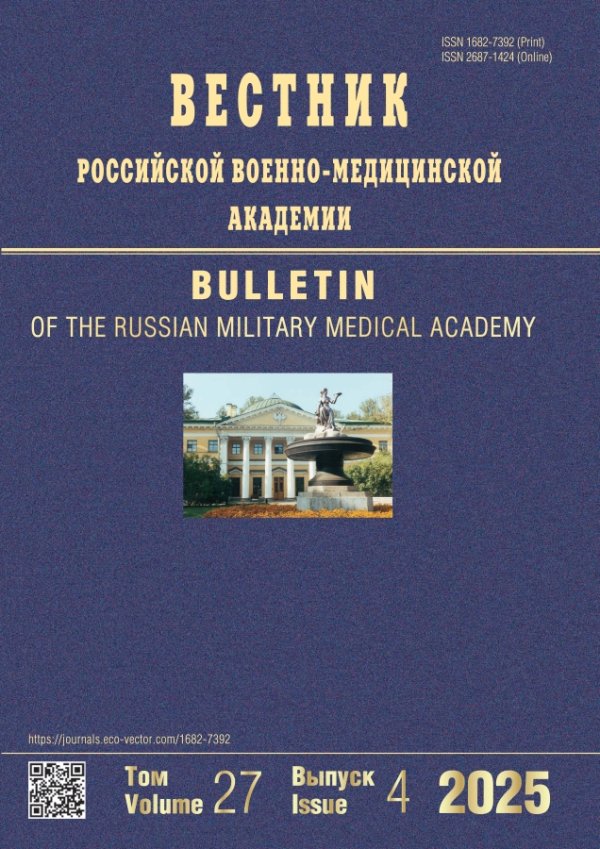Circulation and resorption of cerebrospinal fluid: historic and up-to-date presentation
- Authors: Valchuk SN1, Alekseev DE1, Gavrilov GV1, Stanishevskiy AV1, Svistov DV1
-
Affiliations:
- Военно-медицинская академия им. С.М. Кирова
- Issue: Vol 20, No 2 (2018)
- Pages: 215-220
- Section: Articles
- URL: https://journals.rcsi.science/1682-7392/article/view/12336
- DOI: https://doi.org/10.17816/brmma12336
- ID: 12336
Cite item
Full Text
Abstract
Full Text
##article.viewOnOriginalSite##About the authors
S N Valchuk
Военно-медицинская академия им. С.М. Кирова
Email: svetsvetavalchuk@mail.ru
Санкт-Петербург
D E Alekseev
Военно-медицинская академия им. С.М. КироваСанкт-Петербург
G V Gavrilov
Военно-медицинская академия им. С.М. КироваСанкт-Петербург
A V Stanishevskiy
Военно-медицинская академия им. С.М. КироваСанкт-Петербург
D V Svistov
Военно-медицинская академия им. С.М. КироваСанкт-Петербург
References
- Барон, М.А. Функциональная стерео-морфология мозговых обо- лочек: атлас / М.А. Барон, Н.А. Майорова. - М., 1982. - 352 с.
- Бернар, К. Лекции по физиологии и патологии нервной си- стемы / К. Бернар. - СПб., 1867. - 914 с.
- Блинов, Д.В. Характеристика биохимических маркеров на- рушения проницаемости гематоэнцефалического барьера и функционирования центральной нервной системы / Д.В. Блинов, А.А. Терентьев // Нейрохимия. - 2013. - Т. 30. - №. 3. - С. 179.
- Везалий, А. О строении человеческого тела: в семи книгах /А. Везалий; пер. с лат. В.Н. Терновского и С.П. Шестакова. - М.: Изд-во Академии наук СССР. - 1954. - Т. 6. - 1060 с.
- Кравцова, И.Л. Морфологические особенности и локализация Вирхов-Робеновских пространств в головном мозге / И.Л. Кравцова, М.К. Недзьведь // Проблемы здоровья и эколо- гии. - 2013. - № 3 (37). - С. 21-27.
- Огнев, В.А. Медицина раннего, классического и позднего (эпоха Возрождения) Средневековья / В.А. Огнев, В.А. Мякина, Е.В. Семененко // Харьковский национальный медицинский университет. - 2016. - С. 3-6.
- Фридман, А.П. Основы ликворологии (учение о жидкости моз- га) / А.П. Фридман. - 5-е изд. - Л.: Медицина, 1971. - 648 с.
- Ayer, J.B. The cerebrospinal fluid / J.B. Ayer [et al.] // New York - 1926. - P. 40-45.
- Benveniste, H. Glymphatic System / H. Benveniste, M. Nedergaard // Neuroscience in the 21st Century. - 2016. - P. 1-18.
- Benveniste, H. The Glymphatic Pathway: Waste Removal from the CNS via Cerebrospinal Fluid Transport / H. Benveniste, H. Lee, N.D. Volkow // The Neuroscientist. - 2017. - P. 107.
- Blasberg, R. Absorption resistance of cerebrospinal fluid after subarachnoid hemorrhage in the monkey; effects of heparin / R. Blasberg, D. Johnson, J. Fenstermacher // Neurosurgery. - 1981. - Vol. 9. - № 6. - P. 686-691.
- Chen, L. Pathways of cerebrospinal fluid outflow: a deeper understanding of resorption / L. Chen [et al.] // Neuroradiology. - 2015. - Vol. 57. - № 2. - P. 139-147.
- Gao, F. Hydrocephalus after intraventricular hemorrhage: the role of thrombine / F. Gao [et al.] // Journal of Cerebral Blood Flow and Metabolism. - 2014. - Vol. 34. - № 3. - P. 489-494.
- Gao, C. Role of red blood cell lysis and iron in hydrocephalus after intraventricular hemorrhage / C. Gao [et al.] // Journal of Cerebral Blood Flow and Metabolism. - 2014. - Т. 34. - № 6. - P. 1070-1075.
- Key, A. Studieren in der Anatomie der Nervensystem und des Bindegewebes / A. Key, G. Retzius // Stockholm - 1875-1876. - P. 189-190.
- Linninger, A.A. Cerebrospinal fluid mechanics and its coupling to cerebrovascular dynamics / A.A. Linninger [et al.] // Annual Review of Fluid Mechanics. - 2016. - Т. 48. - P. 219-257.
- Luo, A. Traumatic Posterior Fossa Subdural Hygroma and Secondary Occlusive Hydrocephalus / Luo A. [et al.] // Pediatric Neurosurgery. - 2017. - Т. 52. - №. 5. - P. 336-342.
- Magendie, F. Recherches physiologiques et cliniques sur le liquide céphalo-rachidien ou cérébro-spinal / F. Magendie [et al.] // Méquignon-Marvis fils. - 1842. - Paris, France. - P. 76-79.
- Merritt, H.H. The cerebrospinal fluid / H.H. Merritt, F. Fremont- Smith, J.B. Ayer // The American Journal of the Medical Sciences. - 1938. - Vol. 195. - № 4. - P. 545.
- Plog, B.A. Biomarkers of traumatic injury are transported from brain to blood via the glymphatic system / B.A. Plog [et al.] // Journal of Neuroscience. - 2015. - Т. 35. - № 2. - P. 518-526.
- Ringstad, G. Glymphatic MRI in idiopathic normal pressure hydrocephalus / G. Ringstad, S.A.S. Vatnehol, P.K. Eide // Brain. - 2017. - Т. 140. - № 10. - P. 2691-2705.
- Rose, F.C. Cerebral localization in antiquity / F.C. Rose // Journal of the history of the neurosciences. - 2009. - Vol. 18. - № 3. - P. 239-247.
- Schwalbe, G.A. Lehrbuch der neurologie / G.A. Schwalbe // StrabTubbs, R.S. Hubert von Luschka (1820-1875): his life, discoveries, and contributions to our understanding of the nervous system: Historical vignette / R.S. Tubbs [et al.] // Journal of neurosurgery. - 2011. - Vol. 114, № 1. - P. 268-272.
- Walter, M. A model for intracranial hydrodynamics / M. Walter, S. Jetzki, S. Leonhardt // Engineering in Medicine and Biology Society. - 2005. - P. 5603-5606.
- Yildiz, S. Quantifying the influence of respiration and cardiac pulsations on cerebrospinal fluid dynamics using realétime phase-contrast MRI / S. Yildiz [et al.] // Journal of Magnetic Resonance Imaging. - 2017. - P. 35-37.
Supplementary files







